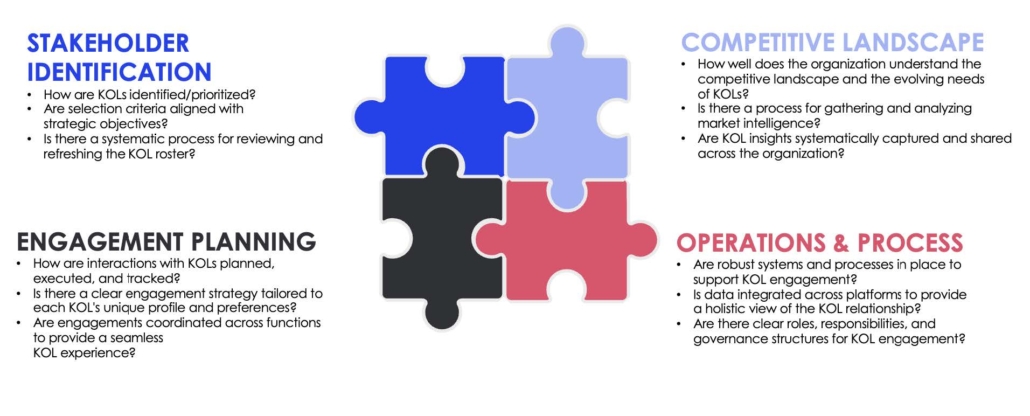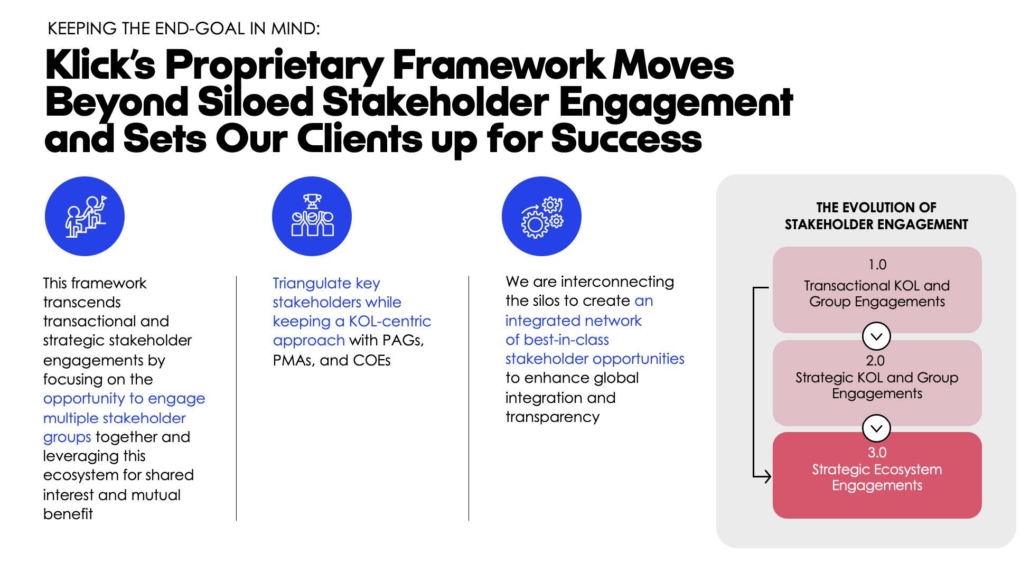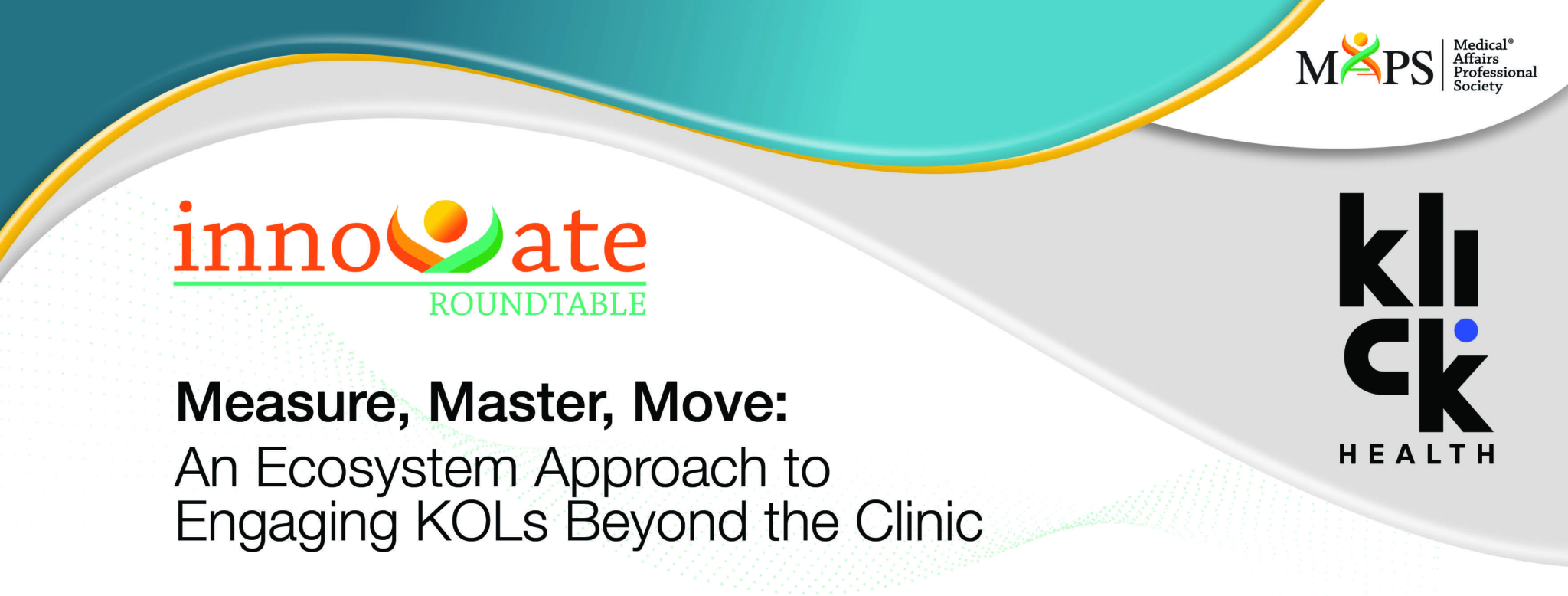Measure, Master, Move: An Ecosystem Approach to Engaging KOLs Beyond the Clinic

Summary of Medical Affairs Professional Society (MAPS) Puerto Rico
Roundtable hosted by Randi Goeckeler and Holly Henry on March 25, 2024
Roundtable Participants / Co-Authors
Laurie Lowe, Director, USMA Training & Excellence, Jazz
Eve Thomas, Associate Vice President, Medical Strategy & Operations, Amgen
Jean-Jacques Murama, Associate Vice President, Global Medical Affairs Office, Lilly
Deborah Long, Senior Vice-President,Medical Affairs, Vertex
Lucie William, Vice President, Global Head of Medical Excellence,Ipsen
Alain Romero, Senior Vice-President, Head of Medical Affairs, GBT/Pfizer
Ann Wheeler, Vice-President, US Medical Affairs, Indivior
Jamie Blais, Global Head of Strategy and Execution GU Solid Tumor Franchise, J&J
Keri Leone, Sr. Director Global Medical Affairs, Dexcom
Discussion summary
Healthcare is undergoing a seismic shift driven by science, technology, and advances in patient empowerment. In this dynamic environment, medical affairs teams must evolve their approach to key opinion leader (KOL) engagement. Transactional interactions focused solely on clinical expertise are no longer sufficient. Today’s KOLs are multi-faceted, wielding influence across research, patient advocacy, and health policy. To this end, medical affairs teams must forge strategic, integrated partnerships that leverage KOLs’ diverse spheres of influence.
So, what are the challenges and opportunities of this new era? Drawing on insights from a roundtable of industry leaders convened by Klick at the recent MAPS conference, let’s look at how viewing the KOL holistically can lead to new avenues of engagement and more multifaceted relationships.
Assessing the Current State: The Stakeholder Maturity Index
To gauge the industry’s readiness for this shift, Klick developed the Stakeholder Maturity Index (SMI), a proprietary framework that evaluates an organization’s KOL engagement capabilities across four key pillars:

The SMI defines four maturity levels for each pillar: Crawl, Walk, Run, and Fly. “Crawl” represents a rudimentary capability with ad hoc processes, siloed data, and limited cross-functional coordination. At the same time, “Fly” indicates best-in-class performance with seamless integration, data-driven decision-making, and demonstrable impact on strategic objectives.

During the MAPS roundtable, participants self-assessed their organizations using the SMI. Most teams ranked themselves as “walkers,” indicating early-stage maturity with significant room for improvement. Key challenges included fragmented KOL data across siloed systems, inconsistent execution between global and local teams, and difficulty demonstrating the impact of KOL engagements. The SMI-based discussions reinforced the need for a new approach to KOL engagement that views relationships as part of a dynamic, integrated ecosystem.
Embracing an Ecosystem Approach
How will we define success in this new era? It begins by recognizing the multi-dimensional roles that KOLs can play. While leading KOLs are expert clinicians, they are also influential researchers, patient advocates, and trusted voices in their communities.
In this regard, medical affairs teams must break down internal silos and embrace cross-functional collaboration. These teams must think exponentially, aligning with clinical development to engage KOLs in research and trial design, partnering with patient advocacy to amplify the patient voice, and working with policy teams to shape the healthcare environment.
Roundtable participants emphasized that relationships in medical, advocacy, and professional society can no longer operate in isolation. Just as KOLs cannot compartmentalize their roles, neither can the organizations that engage with them. Integrated engagement is the only way forward.
Building the Foundation: Processes and Technologies
To operationalize this ecosystem approach, roundtable participants stressed the importance of robust processes and enabling technologies. Integrated CRM platforms provide a solid foundation but are not a complete solution. Well-defined processes for capturing and sharing KOL insights across the organization are equally critical.
The SMI provides a roadmap for building these foundational capabilities. For teams in the “walker” stage, priority actions include establishing clear KOL tiering criteria, systematically tracking engagements, and investing in platforms that provide a unified view of KOL interactions.
As teams progress to the “runner” stage, the focus shifts to more sophisticated analytics and insights generation. Moving beyond merely logging interactions, the emphasis is on deriving meaningful insights from engagement patterns and KOL feedback over time to identify trends, inform strategy, and measure impact.

Redefining the Role of Medical Affairs
Underlying this capability buildup is a fundamental redefinition of medical affairs’ role. No longer a support function at the margins, teams are increasingly positioned as strategic leaders driving scientific excellence and patient-centricity.
Elevating KOL engagement requires starting with a clear articulation of scientific objectives. Interactions must be purposeful by anchoring the KOL strategy in key questions around evidence gaps and practice-changing insights.
This strategic orientation calls for new skills and mindsets within medical affairs, combining deep scientific expertise with curiosity, business acumen, and the ability to connect the dots across the ecosystem. While it’s a tall order, it’s crucial for driving impact. Alongside this skill shift, roundtable participants advocated reframing success measures. Metrics must evolve from activity counts to meaningful outcomes, tracking how KOL engagements shape clinical practice, drive evidence generation, and ultimately improve patient lives.
Navigating the Path Forward
The journey from transactional to transformational KOL engagement is not a quick one. It requires sustained investment in capabilities, culture, and talent. However, the roundtable participants were united in their conviction that the effort was worthwhile.
Engaging KOLs as true partners creates an unprecedented opportunity to accelerate medical progress. Co-creating research agendas, uncovering real-world insights, and tangibly improving patient care provide a compelling “why” to galvanize teams.
The Klick roundtable itself modeled the kind of ecosystem thinking that will drive the future of KOL engagement. The gathering seeded new ideas and collaborations by convening a diverse group of industry leaders, fostering candid dialogue, and sharing best practices.
Conclusion
The new era of KOL engagement demands significant change, but medical affairs teams that embrace the challenge will shape the future of healthcare. The Klick roundtable demonstrated the industry’s readiness to meet this mandate. By sharing learnings and co-creating solutions, medical affairs leaders can chart a bold new course for KOL engagement that leverages the power of the ecosystem to drive transformative impact. As the healthcare landscape evolves, the role of KOLs and medical affairs teams has never been more vital. With strategic vision, collaboration, and unwavering commitment to patients, they hold the power to shape the future.



